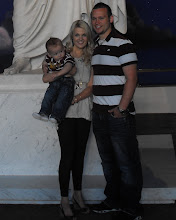I just finished reading a book called Tears and Tantrums by Aletha J. Solter, Ph.D. and highly recommend it. I'm sure there are multiple books out there that support her views and insight but for a fairly quick read it really helps give you a new perspective on children and how to handle their "not so happy moments." I took a child development class a few years ago and although I've had lots of experience with children and love them, I was enlightened to how incredible their learning process is. It's a process. I think because children learn SO much in their first year in particular and because we having this growing notion these days that children are misbehaving if they are crying or not catering around our schedule, that we don't appreciate the miracle they are. As with any book I read, there are things I agree and disagree with but for the most part I found her views well put. I'm going to try to summarize bits of things I read so that you other mom's out there who may or may not have the time to read these books yourselves will hopefully widen your perspective and appreciate for your little ones. Once again I recommend reading the books for yourselves since they go into much more depth and I'm only extracting tiny bits.
- "Parents wonder how to respond to children when they cry, and whether it is appropriate to comfort, ignore, distract, punish, give in, or listen emphatically. Some parents worry that crying means the child is immature, rejecting of the parent, manipulative, or just plain spoiled."
- "Although it is best that crying is never ignored, know that not all crying is an indication of an immediate need or want. Much of it is a natural stess-release mechanism that allows children to heal from the effects of frightening or frustrating experiences that have occurred previously. Children use tears and tantrums to resolve trauma and release tensions. It is therefore not the caretaker's job to stop (repress) the crying or raging, because these behaviors are, in themselves, basic needs from birth on."
- "In response to an environment in which crying is not accepted, children acquire certain rigid behavior patterns to keep themselves from crying."
- Broken cookie-phenomenon: Basically sometimes when a child has a fit over something small/stupid it's really over something that happened earlier that they haven't released yet. For example a little girl is being ignored by all her friends at school, so she flips out over a broken cookie later on. We even do things like that as adults. We've had a rough day at work and take it out on our spouse. We need to be sensitive and let them talk to us about it or just cry it out. (The book goes into more detail about appropriate times/public places. But keep in mind when you have a child it's not all about when it's convenient for you. If you repress it too much it 1) may build up and 2) effect their security to be able to come talk with you later on and as they get older)
- Children sometimes make use of the "broken-cookie" phenomenon by finding pretexts to cry heavily. Same with babies (6 months or older). I know Kohen seems to push his boundaries more when he's tired.
-Children under the age of five are (of course ego-centric/can't really see past their own needs) and experience emotions VERY strongly. They don't understand why you have to finish something real quick before rushing to their aid. They want something and they want it now! And because they have a hard time or are not able to communicate their wants and needs it is very frustrating to them. I have found that just taking the time (even sometimes the time I don't have) to just really pay attention and remember it's all about them, has made a world of difference. Kohen can sense that I'm trying and am patient and usually it's really easy to tell what is wrong. We often think that we need to "fix" it and get them to stop crying when, like the author explains, it's more about helping to release and work through some of those stressors.
I know I've gotten caught up before in the thinking of "spoiling" Kohen if I rush to his aid to am going to make him a sissy. But the more I've educated myself about the actual development of babies/children and the effects of our parenting styles the more I've realized how misinformed that is. You CAN'T "baby" a baby. You teach by love and example. Any great example (Jesus or moms you hear about) are always loving and selfless. That is what I hope to achieve I guess in addition to trying to be the best parent I can for my baby.
I have to say, I have a pretty great mom. I think she has demonstrated these views and so it's made it much easier to understand babies and children...particularly Kohen. I love that I'm able to view my son with such love and appreciation and in return being able to develop that much closer of a bond.

